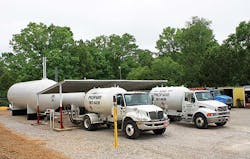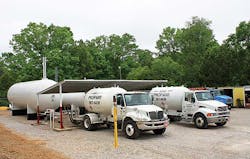North Carolina propane distributor builds thriving operation
A variety of factors draw people to the propane distribution business. In Rickey Watkins case, it was the experience he gained working for a propane and natural gas equipment distributor.
For 17 years, Watkins worked for Raleigh, North Carolina-based Gardner Marsh Gas Equipment, a value-added distributor of propane and natural gas equipment and appliances. While at Gardner Marsh, Watkins worked in the company’s plant construction business and helped supply a significant number of Gardner Marsh’s customers with some of the best products and services available to the propane bulk plant industry.
Then, in 1994, Watkins took the experience he had accumulated in propane-plant construction and left to open his own business, which he named Apex Propane Service and based in Apex, North Carolina. Apex is about 15 miles south of Raleigh.
In the ensuing 18 years, Apex Propane grew to become a well-recognized name in the retail propane market and propane-plant construction industry over a five-state area, from the Carolinas north to West Virginia, Virginia, and Maryland.
Today, Apex Propane runs five bobtails serving customers primarily within a 45-mile radius of Apex. Sixty-percent of deliveries are to rural customers and most of the remainder is to customers in suburban housing developments.
“The economy is reasonably strong in this area, and we certainly have benefitted from that,” Watkins says. “There has been a lot of new construction, and demand for propane is growing.
“We serve primarily residential customers, but we do have some commercial accounts. About half of the propane we sell is used just to heat homes and business. A number of customers also use propane for cooking and for water heaters.”
Heating focus
Apex Propane is busiest during the primary heating season that runs from late August through the winter months. “We start summer fills during at the end of August to get ready for winter, and our bobtails get busier and busier,” Watkins says. “In the spring, April begins our slower season when we may have only one or two trucks operating.”
To serve its customers, the propane distributor runs Ford, Freightliner, and International trucks. All of them have open rear decks and 2,600-gallon Trinity MC331 barrels. Hardware includes Fisher internal valves and hose nozzles, Neptune meters, and Blackmer product pumps. All of the trucks carry 150 feet of delivery hose.
Drivers load propane for customer delivery at Apex Propane’s small bulk plant. Two storage tanks each have a 30,000-gallon capacity. Much of the hardware—including Blackmer product pumps—for the bulk plant came from Watkins’ former employer, Gardner Marsh.
“Apex Propane is now a long-standing customer of ours, and through our capacity as a value-added distributor, we provide them with technical assistance and sizing assistance for their plant projects and their retail propane business,” says Steve Ward, a sales executive with Gardner Marsh. “We have had a great relationship with Apex since its inception and have watched it grow to become known throughout the Carolinas.”
Right equipment
In his 30-plus years in the propane business--on both the equipment distributor and end-user sides--Watkins learned the value of identifying the right equipment for the job, equipment that is both reliable and meets the specific needs of a wide array of propane-related applications. And when you do find equipment that satisfies the varying needs of the end-user, there is every reason to continue to recommend that brand, as long as it keeps performing.
“While working for Gardner Marsh for 17 years, I installed a lot of Blackmer pumps, so I knew the brand when I started Apex Propane,” Watkins says. “I’ve always liked Blackmer. Their pumps always perform and they definitely make my job easier.”
So, when Blackmer introduced the new LGL3021 Series Multi-Purpose LPG Sliding Vane Pump to the market in early 2012, Ward asked Watkins if he had any clients who might be on the lookout for a new LPG pump for their LPG-transfer operations. It turned out that Watkins had the most important customer in mind: Himself.
“I had reminded Rickey to let me know that if he ran into an application that needed a pump like this that we could supply a Blackmer LGL3021 on a trial basis,” Ward says. “When I called him back a few months later to see if he had any jobs that required this type of pump, he said that he had two competitor’s pumps at his retail propane office that could be replaced, and that he would agree to be the test case and allow us to install the LGL3021 pump for a performance trial.”
Test pump
The decision to install the Blackmer test pump was really a no-brainer for Watkins for a few reasons: No pipe changes were needed; the wear parts that were needed were readily available; and the pump is protected by Blackmer’s performance warranty, which is acknowledged as the “best standard warranty in the business.”
The initial switchout took place in March 2012—with the second Blackmer LGL3021 pump installed in April 2012—and it has been full-speed ahead, literally, from day one for Apex Propane.
“The Blackmer is real quiet, and it pumps real well,” Watkins says. “We’re also getting 130 gallons per minute (gpm) out of the new Blackmer, which is 30% (32 gpm) more than we were getting from the old pump. That’s a big plus when you’re trying to get your trucks loaded quickly.”
The LGL3021 pump can deliver these elevated flow rates because it has been designed for high-volume LPG-transfer applications at bulk plants and terminal facilities. Based on Blackmer’s LGLD3 Series transfer pump, the LGL3021 provides the same horsepower requirements and foot-to-flange and flange-to-flange dimensions as competitive pumps.
More flow
What also separates the LGL3021 from competitive pumps is that it provides significantly more flow depending on the LPG installation and application conditions, a major consideration during bulk plant and terminal operations. LGL3021 pumps feature ductile-iron construction with an internal relief valve that protects against excessive pressures, ensuring performance and reliability even under the most severe service conditions.
Additional features and benefits of the LGL3021 include: replaceable casing liners and end discs for easy rebuilding of the pumping chamber; a patented cavitation suppression liner designed for reducing the noise, vibration and wear normally caused by entrained vapors; excellent self-priming and dry-run capabilities; easy maintenance; made in the United States; and covered by Blackmer’s best-in-class performance warranty. LGL3021 pumps are available with differential pressures up to 150 psi (10.35 bar) and maximum pump speeds of 800 rpm.
“With the interior design of this pump, the way the vanes work, you have the capacity to sweep more gas out of the pump cavity than you do with alternative pumps, at equal or lower speeds,” Ward says. “We see the LGL3021 as being a huge growth opportunity for Blackmer in the next few years.”
Increased flow speeds and fill rates are not the only crucial time improvements that the LGL3021 pump offers to its users. The pump’s design allows for easy installation during pump changeovers or plant maintenance without the need to change piping or motor drives because the inlet and discharge flanges are on the pump shaft’s centerline.
“When we went to switch out the old pump with the new Blackmer, it lined up perfectly,” says Watkins. “You don’t have to take the pump loose from the base or the flanges, you just slide it right in. I was impressed with that.”
Ward adds: “Any dealer can change out a pump now. Before, a changeout required breaking or cutting welded pipe. Now no re-welding is necessary. You just remove the outlet flange, slide the old pump out, slide the LGL3021 pump in, and tighten the flanges. It can be done without a pipe wrench. It can also be done without calling a construction professional, which takes time and is an additional cost. If a pump goes down, you can switch it out in a matter of minutes.”
For more than three decades, Watkins worked hard to build a positive reputation in the retail propane and propane-plant construction markets in the Southeast. Specifying quality equipment in his operation helps protect that reputation by ensuring that Apex Propane can meet customer needs and expectations.

